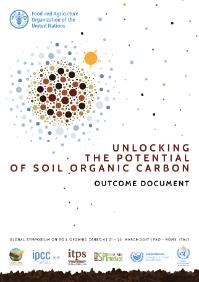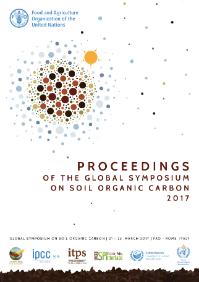Focal point
Location
The Food and Agriculture Organization of the United Nations leads international efforts to defeat hunger. Serving both developed and developing countries, FAO acts as a neutral forum where all nations meet as equals to negotiate agreements and debate policy. FAO is also a source of knowledge and information. We help developing countries and countries in transition modernize and improve agriculture, forestry and fisheries practices and ensure good nutrition for all. Since our founding in 1945, we have focused special attention on developing rural areas, home to 70 percent of the world's poor and hungry people.
Members:
Resources
Displaying 241 - 245 of 5074Unlocking the Potential of Soil Organic Carbon – Outcome Document of the Global Symposium on Soil Organic Carbon
This document presents the main outcomes of the Global Symposium on Soil Organic Carbon (GSOC17) held at FAO headquarters (Rome, 21-23 March 2017). It presents key messages intensively discussed and developed by the GSOC17 participants and subsequently reviewed and synthesized by the Scientific Committee. The GSOC17 Outcome Document highlights major issues and future directions regarding Soil Organic Carbon preservation and enhancement in research, practice and policy.
Transboundary River Basin Overview – Asi-Orontes
This river basin overview describes the state of the water resources and water use, as well as the state of agricultural water management in the Asi-Orontes basin. The aim of this report is to describe the particularities of this transboundary river basin and the problems met in the development of the water resources, and irrigation in particular. Irrigation trends, existing policies and legislation to water use in agriculture, possible treaties and agreements between countries as well as prospects for water management in agriculture are presented, as described in literature.
Proceedings of the Global Symposium on Soil Organic Carbon 2017
The Proceedings of the Global Symposium on Soil Organic Carbon 2017 (GSOC17) presents the abstracts of all scientific presentations held during the GSOC17. 103 oral presentations and 35 poster presentations built the core of this event triggering fruitful discussions on the state-of-science in measuring, preserving and enhancing soil organic carbon in different soils of the world.
Commémoration du 5eme Anniversaire des Directives Volontaires sur les Régimes Fonciers
Le 11 mai 2017 a marqué le 5ème anniversaire de l’approbation des Directives volontaires pour une gouvernance responsable des terres, des pêches et des forêts dans le contexte de la sécurité alimentaire nationale (DV) par le Comité de la sécurité alimentaire mondial (CSA). Les DV ne sont plus simplement des mots dans un document et leurs principes et processus incitent les personnes du monde entier à agir et à changer leur réalité.
An overview of legal and institutional frameworks and opportunities, challenges and recommendations for geographical indication products in Armenia, Georgia, Kyrgyzstan, the Republic of Moldova and the Russian Federation
Geographical indication (GI) schemes can play a special role in promoting sustainable rural development, improving farm income and opening new export potential. Natural factors such as soil, climate and plant varieties play a major role in producing a unique product. Usually, GIs comprise knowledge and skills passed on from generation to generation, helping to protect local heritage. This report is a synthesis of the five national reviews of the legal and institutional frameworks in Armenia, Georgia, Kyrgyzstan, the Republic of Moldova, and the Russian Federation.











